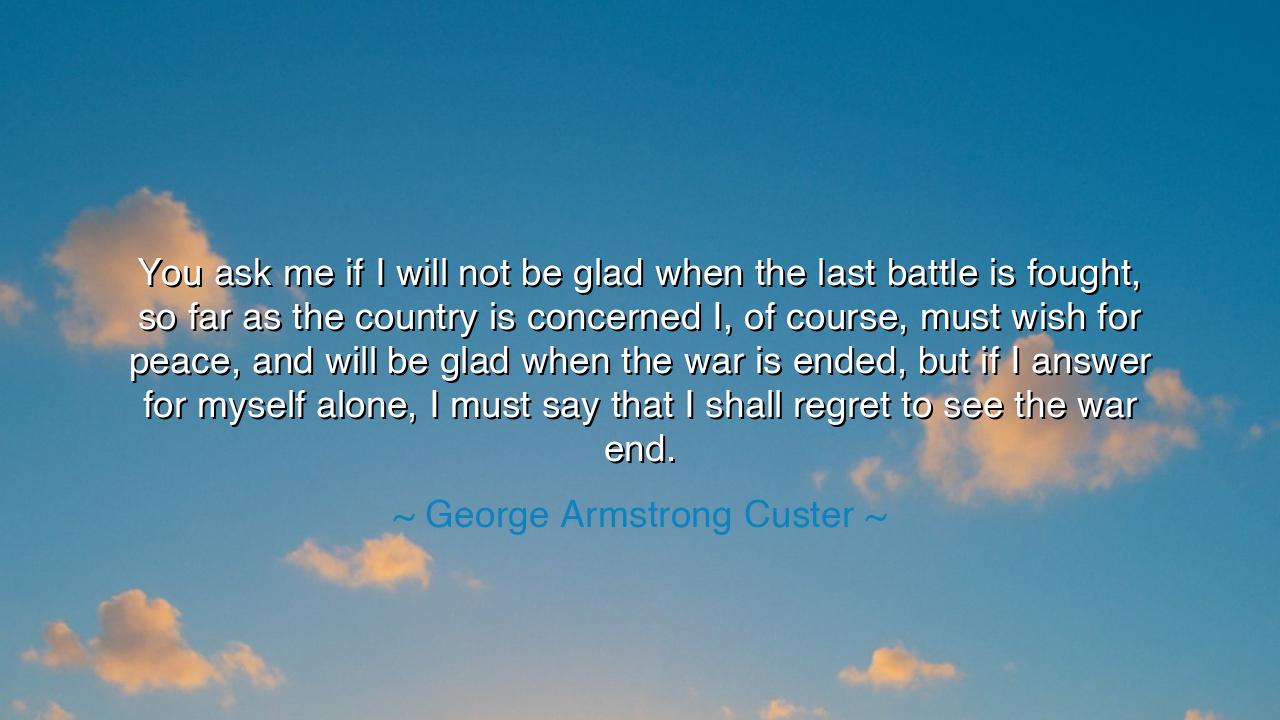
You ask me if I will not be glad when the last battle is fought
You ask me if I will not be glad when the last battle is fought, so far as the country is concerned I, of course, must wish for peace, and will be glad when the war is ended, but if I answer for myself alone, I must say that I shall regret to see the war end.






When George Armstrong Custer uttered the words, “You ask me if I will not be glad when the last battle is fought, so far as the country is concerned I, of course, must wish for peace, and will be glad when the war is ended, but if I answer for myself alone, I must say that I shall regret to see the war end,” he revealed one of the most haunting truths of the warrior’s heart. Beneath the surface of patriotism and duty lies something deeper — a strange, fiery longing for the battlefield, where purpose burns brightest and the soul feels most alive. It is not the thirst for blood that drives such men, but the hunger for meaning, the terrible beauty of conflict, and the unity it brings between life and death, courage and fear, glory and ruin.
Custer, born of an age of valor and violence, was forged in the fires of the American Civil War, a conflict that tested the spirit of a nation and the mettle of every soul who bore its burden. He was a man who rose swiftly through the ranks, a soldier who tasted the ecstasy of command and the thunder of victory. In war, he found not only danger but identity — a place where his restless energy and boundless daring could find expression. Thus, when he spoke of regretting the end of war, it was not treason to peace, but confession to the truth that peace, though noble, often leaves the warrior’s soul unanchored. For in peace, the world grows quiet — too quiet for one who has learned to hear the music of the storm.
This paradox has echoed through the ages. Alexander the Great, after conquering the known world, wept because there were no more worlds left to conquer. He had known the thrill of battle, the fierce union of purpose that comes when a man stands on the edge of eternity. The clash of swords, the surge of command, the heartbeat between life and death — these were not mere experiences but revelations of being. When the noise ceased and victory was his, a great silence filled his heart. He, too, had come to know what Custer knew: that peace can feel like exile to the one whose soul has been awakened by struggle.
There is something eternal in this yearning — a truth not confined to soldiers alone. Every man and woman who has ever fought for something beyond themselves, whether in war or in the quiet battles of the heart, knows this strange sorrow. When the fight ends — when the struggle that gave life its shape is suddenly gone — a void appears. The artist who finishes his masterpiece, the leader who completes his mission, the lover who wins the heart long pursued — each feels that pang of emptiness after triumph, for it is the striving, not the attainment, that makes the spirit soar. As Custer’s words remind us, the fire of purpose can sometimes burn brighter than the peace that follows it.
Yet there is also wisdom in this longing. The ancients taught that the warrior’s duty is not merely to fight, but to transform the energy of battle into the discipline of peace. A true soldier, like a true soul, must learn to wield his inner fire without the battlefield. When the outer war ends, the inner war begins — the struggle to live with meaning, to serve without glory, to find purpose in the quiet. For though the world may grow still, the noble heart must not grow idle. It must learn to fight new wars — the wars of conscience, of virtue, of the spirit.
Consider the story of Ulysses, the old warrior-king of Ithaca, who after long years of war and wandering, found peace at last upon his throne. Yet even then, his heart was restless. “I cannot rest from travel,” he said, “I will drink life to the lees.” He longed once more for adventure, for the great sea that had both tested and defined him. So too, Custer’s confession was not of bloodlust, but of that same restless spirit — the eternal call to challenge, to striving, to greatness, even when the world demands rest.
Thus, let the lesson of Custer’s words sink deep into the heart: It is not wrong to love the struggle, if one fights for what is right. But one must also learn to carry the spirit of battle into the gentler fields of peace. The courage that faces death must learn to face life — with patience, humility, and purpose renewed. For though the war may end, the call to grow, to strive, to overcome never ceases.
So, my children, remember this truth: the battle may give life its fire, but peace gives it its direction. When your own wars are done — when you have conquered, or lost, or simply grown weary — do not mourn the silence. Let the lessons of the fight become the wisdom of your days. For the spirit that truly loves the fight does not die with the battle’s end; it transforms, becoming the strength to build, to protect, to love, and to live with valor in the calm after the storm.






AAdministratorAdministrator
Welcome, honored guests. Please leave a comment, we will respond soon